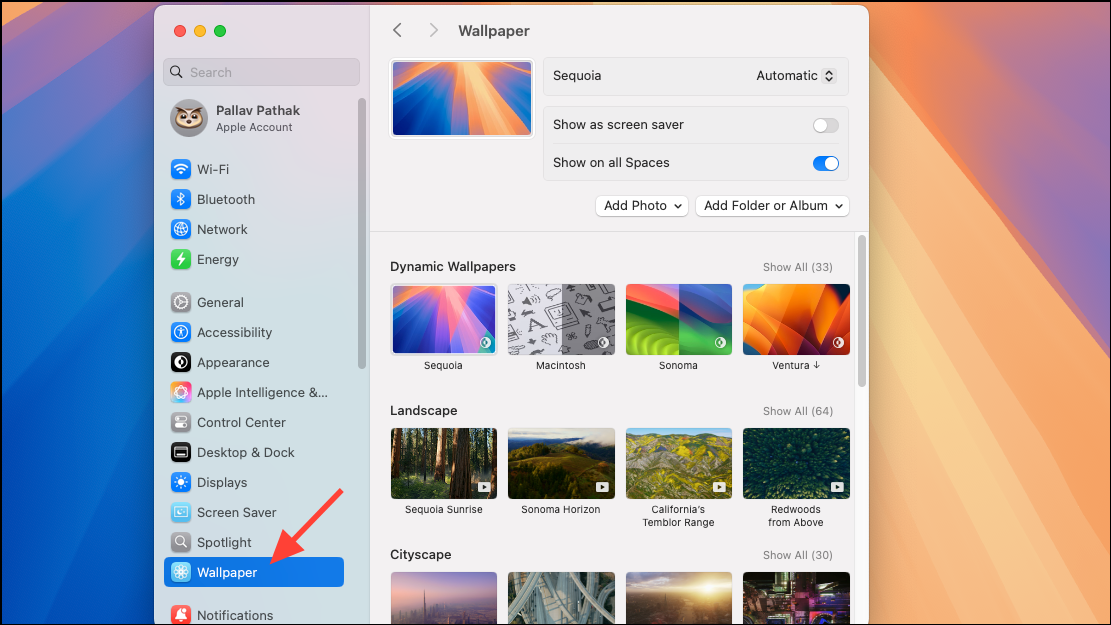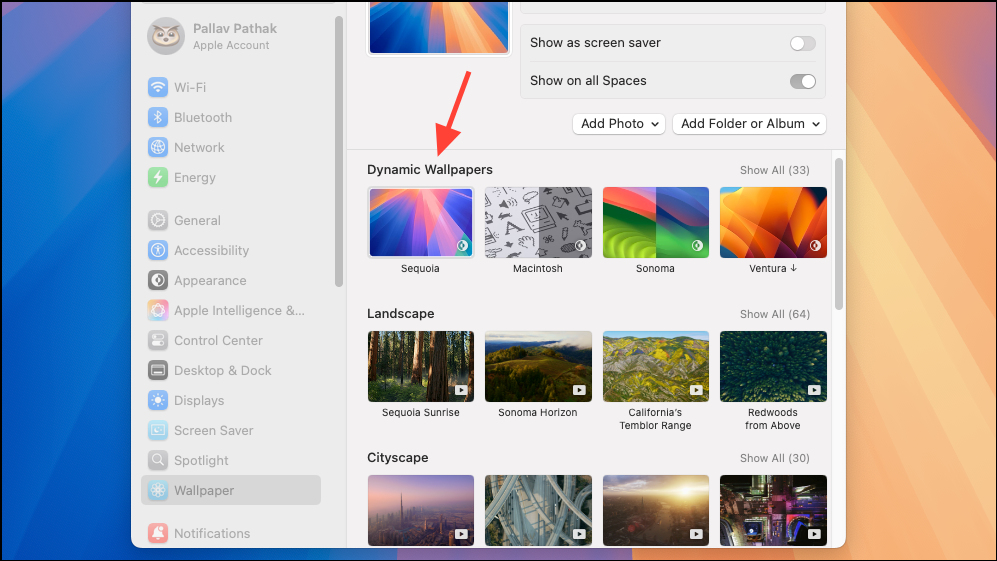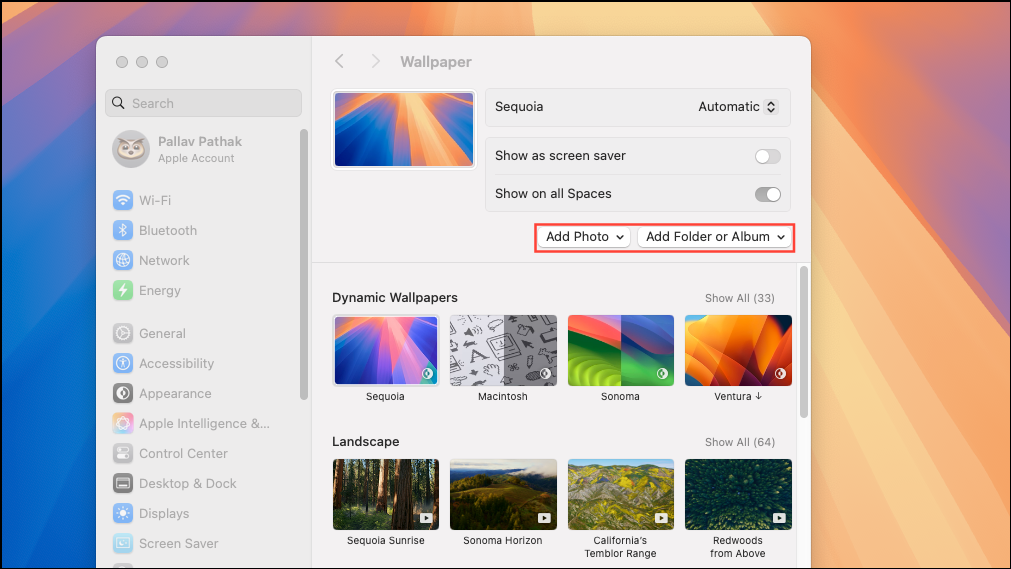macOS 15 supports dynamic wallpapers that shift throughout the day, allowing your desktop background to reflect the current time, lighting conditions, or even your geographic location. This boosts visual interest and can reduce eye strain by aligning display brightness and color with your environment. Below are the most effective methods to set up and customize dynamic wallpapers on your Mac.
Set Built-in Dynamic Wallpapers in macOS 15
Step 1: Access the wallpaper settings by clicking the Apple menu and selecting System Settings. In the sidebar, choose Wallpaper.

Step 2: In the wallpaper selection window, locate the Dynamic Wallpapers section. Browse through the available options. If you select a wallpaper that hasn’t been downloaded yet, macOS will automatically retrieve it from Apple’s servers.

Step 3: After choosing your preferred dynamic wallpaper, ensure the mode is set to Automatic or Dynamic in the drop-down menu near the wallpaper’s name. Some wallpapers may offer additional settings, such as Color or Light/Dark Mode.
Step 4: The wallpaper will now update automatically based on your system’s clock or, if location services are enabled, the position of the sun at your geographic location. This provides a seamless transition from bright daytime scenes to darker nighttime visuals.
Built-in dynamic wallpapers require no additional software and integrate tightly with macOS features like Light and Dark Mode. If your system is set to auto-switch between modes, your wallpaper will reflect these changes instantly.
Create Custom Dynamic Wallpapers Using Third-Party Apps
macOS does not natively allow users to create their own multi-stage dynamic wallpapers. However, several third-party tools fill this gap, offering robust customization and scheduling features.
Using Dynaper
Step 1: Download and install the Dynaper app from the Mac App Store. Launch the application on your Mac.
Step 2: Dynaper presents two main creation modes: one for Light/Dark Mode wallpapers and another for time-based dynamic wallpapers. To create a wallpaper that shifts based on time of day, select the time-based option.
Step 3: Drag and drop your chosen images into the application window. Each image should represent a different time of day (e.g., morning, afternoon, evening, night). Ensure all images have the same dimensions for smooth transitions.
Step 4: Assign specific times for each image to appear. Dynaper allows precise scheduling, so you can match wallpaper changes with sunrise, sunset, or any preferred interval.
Step 5: Once your sequence is ready, click Export to generate a dynamic HEIC file. You can set the image as your wallpaper immediately or do so later.
Step 6: To use your new dynamic wallpaper, return to System Settings > Wallpaper, click Add Photo, and select your exported HEIC file. The system will recognize it as a dynamic wallpaper and manage transitions according to your defined schedule.
Dynaper is free to use with watermarks; removing watermarks requires an in-app purchase. This tool streamlines the process, especially for users with multiple custom images and specific timing needs.
Using Equinox
Step 1: Download Equinox from the Mac App Store and open the application.
Step 2: Choose the mode for your dynamic wallpaper: Solar (changes based on sunrise/sunset at your location), Time (custom schedule), or Appearance (switches between Light and Dark Mode).
Step 3: Import your images by dragging them into the app or browsing manually. For Solar mode, you’ll need to enter altitude and azimuth data, which Equinox can help calculate based on your region and time of day. For Time mode, assign specific times for each image.
Step 4: Click Create. Equinox will compile your images and metadata into a dynamic wallpaper file. Save the result or set it directly within the app.
Equinox offers fine-grained control over transitions and supports complex dynamic wallpapers, making it ideal for advanced users or those wanting solar-based changes.
Online Tools: Dynamic Wallpaper Club
The Dynamic Wallpaper Club website allows users to create, download, and share dynamic wallpapers. It supports both time-based and sun-based transitions.
Step 1: Visit the Dynamic Wallpaper Club website and sign up for a free account if you wish to create your own wallpaper.
Step 2: Use the web interface to upload your images, set transition times or sun positions, and preview the dynamic sequence. The platform requires all images to have the same size and aspect ratio.
Step 3: Once finished, export the wallpaper as a HEIC file. Download it to your Mac.
Step 4: Set the wallpaper in System Settings > Wallpaper by clicking Add Photo and choosing your downloaded HEIC file.
This method offers community sharing and a wide gallery of user-created dynamic wallpapers, although custom creations may take longer to process depending on server load.
Automatically Change Wallpapers at Set Intervals
macOS also allows users to rotate through a folder of wallpapers at fixed intervals, which is different from true dynamic wallpapers but achieves a similar effect for those who want frequent changes.
Step 1: In System Settings > Wallpaper, scroll down and click Add Folder or Add Photo Album to select a directory containing your desired wallpapers.

Step 2: Once the folder appears in the wallpaper list, activate Auto-Rotate for that folder.
Step 3: Set the time interval for wallpaper changes (e.g., every 5 minutes, 30 minutes, or hour) using the drop-down menu next to the Auto-Rotate toggle.
Step 4: Optionally, enable random order to shuffle the sequence of wallpapers.
This approach is quick to set up and works well for users who want frequent visual variety without the complexity of dynamic HEIC files or time-of-day transitions.
Download High-Quality Dynamic Wallpapers
For users seeking ready-made dynamic wallpapers, several resources offer curated collections:
- Dynamic Wallpaper Club Gallery: Community-driven dynamic wallpapers, free to download.
- 24 Hour Wallpaper App: Over 100 high-resolution time-based wallpapers, available via paid app or individual purchase.
- Jetson Creative Gallery: Packs of dynamic wallpapers, optimized for 5K displays and supporting Light/Dark Mode transitions.
Download the HEIC files and use Add Photo in System Settings > Wallpaper to apply them.
Dynamic wallpapers on macOS 15 offer a polished way to keep your desktop visually aligned with the time of day. Whether you use built-in options, create custom sequences, or rotate through a folder of images, you can tailor your Mac’s appearance to your style and schedule with just a few clicks.

